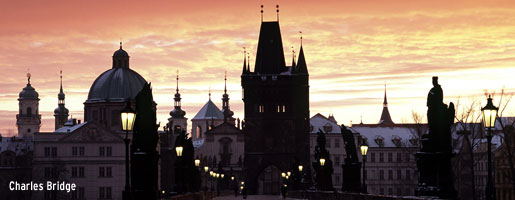Travelling to Prague

Prague is the capital and largest city of the Czech Republic. Its official name is hlavní mesto Praha, meaning the Capital City of Prague.
Situated on the River Vltava in central Bohemia, Prague has been the political, cultural, and economic center of the Czech state for over 1100 years. The city proper is home to nearly 1.2 million people, while its metropolitan area is estimated to have a population of over 1.9 million.
Prague is widely considered to be one of the most beautiful cities in Europe and is among the most visited cities on the continent. Since 1992, the historic centre of Prague has been included in the UNESCO list of World Heritage Sites. Nicknames for Prague have included "the mother of cities" (Praga mater urbium, or "Praha matka mest" in Czech)", "city of a hundred spires" and "the golden city".
Source: Wikipedia, http://en.wikipedia.org/wiki/Prague (November 2007)
Visas and Letters of Invitation
The Czech Republic became a member of the EU in 2004. There are different rules for citizens of other EU member countries than for tourists from other parts of the world. Everyone must carry ID at all times.
EU citizens
Citizens of EU member states need a passport or other ID document to enter the Czech Republic. The same is true for citizens of Switzerland, Norway, Iceland and Liechtenstein, who enjoy free movement around the EEA (European Economic Area).
Schengen Group
The Czech Republic has not entered to the so-called Schengen Group yet, but it will at the end of this year (December 31, 2007), therefore the Schengen rules will apply at the event time (January 2008).
This group of countries have come together to enable people to cross their borders without passport controls. Despite this, however, a valid passport or other ID will still have to be carried at all times.
Non-EU citizens and Non-Schengen countries citizens
Visitors from other countries require a passport with at least six months validity on the day of arrival and in some cases a visa. If you need to apply fo a visa, please do so well in advance of your journey.
For more information on who require a visa to enter the Czech Republic, visit the Ministry of Foreign Affairs of the Czech Republic official website or contact your local Ministry of Foreign Affairs office.
A list of countries with visa waiver regimes can be found at http://www.mzv.cz/wwwo/mzv/default.asp?id=25931&ido=7306&idj=2&amb=1
Participants requiring an official letter of invitation for visa process, please contact our local host through Mrs. Lenka Kasparova, and provide her your full name, organization, complete mailing address, telephone number, fax number and e-mail address.
In Prague there is only one airport (Ruzyne). Online arrival and departure can be checked at Prague Airport website.
Directions from the Airport to the event venue (Olympik-Artemis)
By public transport
Before you enter METRO you have to buy a ticket from vending machine or in some of magazine/tabaco/newsagents for 20 CZK (one hour in any of public transport) or from the driver for 25 CZK (that applies only for the buses, not available in the train and metro).
Take bus No 100 from the airport to final stop Zlicin. Take metro (yellow line, B) to Invalidovna metro station (approx. 35 minutes). Conference venue is located within 400m distance from the Invalidovna Station.
Airport limousines
Airport limousines CEDAZ takes few passengers to the city center.
Taxi
Recommended companies are AAA, phone number 14014 and Sedop, phone number +420-271 722 222. The price to hotel Olympik-Artemis should be around 600 CZK.
Train
There are 2 main Railway Stations in Prague:
- Main Railway Station (Hlavni nadrazi), by metro:
Buy a ticket first - if you change any of the line (metro, tram, bus) you need to buy 20 CZK ticket which allows you to spend 1 hour in any of public transport. If you are going shorter way without changing the lines you can buy a 14 CZK ticket which allows you to spend 15 minutes in any of the public transportation.
Take the red line C (direction Ladvi) to the station FLORENC (1 stop) and there change to line B (yellow one, direction Cerny Most) to the Invalidovna station (2 stops).
- Holesovice Railway Station (Nadrazi Holesovice), by metro:
Take the red line C (direction Haje) to the station FLORENC (2 stops) and there change to line B (yellow one, direction Cerny Most) to the Invalidovna station (2 stops).

